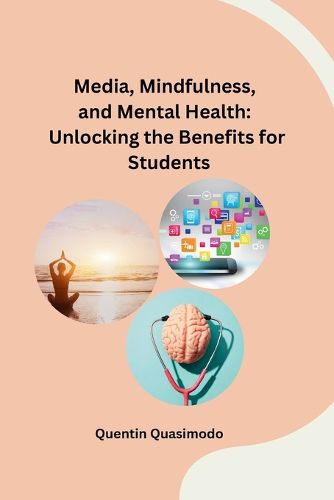Readings Newsletter
Become a Readings Member to make your shopping experience even easier.
Sign in or sign up for free!
You’re not far away from qualifying for FREE standard shipping within Australia
You’ve qualified for FREE standard shipping within Australia
The cart is loading…






This title is printed to order. This book may have been self-published. If so, we cannot guarantee the quality of the content. In the main most books will have gone through the editing process however some may not. We therefore suggest that you be aware of this before ordering this book. If in doubt check either the author or publisher’s details as we are unable to accept any returns unless they are faulty. Please contact us if you have any questions.
In today's digital age, media plays a significant role in shaping our lives. From television shows and movies to social media platforms, we are constantly bombarded with information and entertainment. While media has its benefits, it also has a profound impact on our mental health. Understanding this connection is crucial, especially for students who are highly exposed to various forms of media.
One aspect that can positively influence mental health in the realm of media is meditation. Meditation is a practice that allows individuals to focus their minds and achieve a state of mental clarity and calmness. It has been proven to reduce stress, anxiety, and improve overall well-being. Incorporating meditation into our media consumption habits can be highly beneficial for students.
When engaging with media, students often experience heightened emotions, whether it's due to the pressures of academic performance or the influence of social media. Meditation can help students develop a sense of mindfulness, enabling them to become aware of their emotions and thoughts while engaging with media. This self-awareness allows students to make conscious choices about their media consumption and prevent negative impacts on their mental health.
Furthermore, meditation can help students establish a healthy relationship with media. It encourages them to approach media with intention and mindfulness rather than mindlessly consuming content that may be harmful or triggering. By developing a regular meditation practice, students can cultivate a sense of balance and control over their media consumption, ensuring it aligns with their mental health goals.
Incorporating meditation into media consumption also allows students to enhance their critical thinking skills. It enables them to analyze and evaluate the messages conveyed by media sources, promoting a more discerning and responsible approach to media consumption. Students can learn to question the accuracy and credibility of information presented in media, reducing the potential for misinformation to negatively impact their mental well-being.
$9.00 standard shipping within Australia
FREE standard shipping within Australia for orders over $100.00
Express & International shipping calculated at checkout
This title is printed to order. This book may have been self-published. If so, we cannot guarantee the quality of the content. In the main most books will have gone through the editing process however some may not. We therefore suggest that you be aware of this before ordering this book. If in doubt check either the author or publisher’s details as we are unable to accept any returns unless they are faulty. Please contact us if you have any questions.
In today's digital age, media plays a significant role in shaping our lives. From television shows and movies to social media platforms, we are constantly bombarded with information and entertainment. While media has its benefits, it also has a profound impact on our mental health. Understanding this connection is crucial, especially for students who are highly exposed to various forms of media.
One aspect that can positively influence mental health in the realm of media is meditation. Meditation is a practice that allows individuals to focus their minds and achieve a state of mental clarity and calmness. It has been proven to reduce stress, anxiety, and improve overall well-being. Incorporating meditation into our media consumption habits can be highly beneficial for students.
When engaging with media, students often experience heightened emotions, whether it's due to the pressures of academic performance or the influence of social media. Meditation can help students develop a sense of mindfulness, enabling them to become aware of their emotions and thoughts while engaging with media. This self-awareness allows students to make conscious choices about their media consumption and prevent negative impacts on their mental health.
Furthermore, meditation can help students establish a healthy relationship with media. It encourages them to approach media with intention and mindfulness rather than mindlessly consuming content that may be harmful or triggering. By developing a regular meditation practice, students can cultivate a sense of balance and control over their media consumption, ensuring it aligns with their mental health goals.
Incorporating meditation into media consumption also allows students to enhance their critical thinking skills. It enables them to analyze and evaluate the messages conveyed by media sources, promoting a more discerning and responsible approach to media consumption. Students can learn to question the accuracy and credibility of information presented in media, reducing the potential for misinformation to negatively impact their mental well-being.